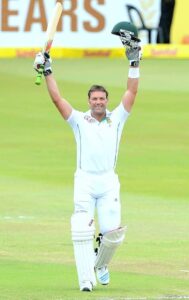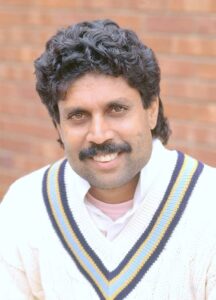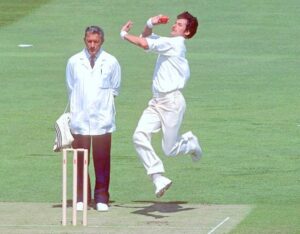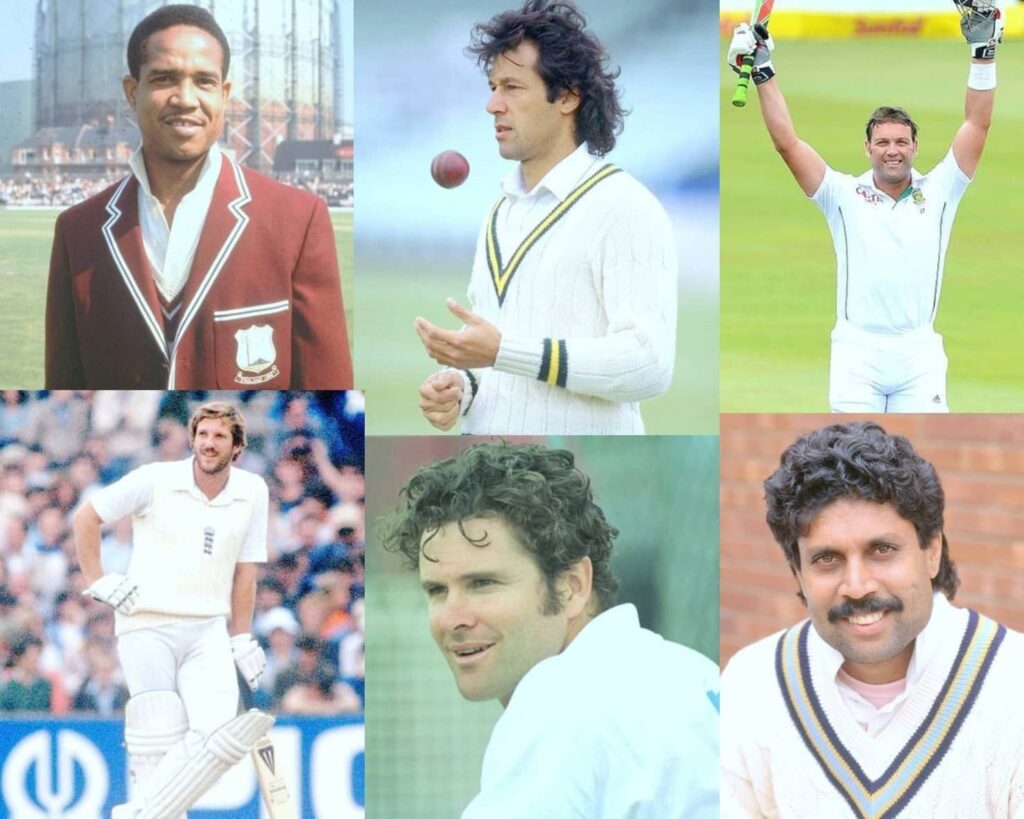A special cricket player known as a “all rounder” is one who excels at all three aspects of the game: batting, bowling, and fielding. Effective bowling and batting demand a specific talent, as well as extremely high level of fitness. Only a select few cricket players have the talent to be regarded as potent and versatile weapons with both the ball and the bat. With bat and ball, the best all rounder in the world have dominated every aspect of the game, helping their teams win numerous matches. So let’s learn about some of the greatest all rounders of all time who contributed greatly to the game.
Here’s a list of Top 10 Best All Rounder In The World –
1. Jacques Kallis
Simply in the modern age of cricket, Jacques Kallis is the best all rounder in the world. No one has ever played more international matches as the top all-rounder in the ICC Test rankings than Kallis did. Although his fast medium bowling may have been considered his backup, from 1998 through 2008, he averaged 22 Test wickets per year. 13,289 runs, 292 wickets, and 200 catches are all record-breaking numbers for Kallis in Test matches. With the exception of Garry Sobers and Sangakkara, Kallis’ Test average of 55.37 is higher than every other batsman with 8,000 runs to his name.

His entire stroke repertoire, length judgement, and placement skill were fabulous. Before his knees began to bother him, he bowled beautifully and his upper body strength provided deadly bounce as well. His consistency with the bat and the ball allowed him to avoid injuries for the most of his career. One of the best indicators of Kallis’ calibre was his Test record versus Australia. One of just six batters to do so since 1995, he scored more than 2,000 Test runs against them at an average of 45.43 with five hundreds (he also took 51 wickets).
He assisted South Africa in winning the inaugural 1998 ICC Champions Trophy final, he took 5-30 against the West Indies which is still the single ICC trophy in their collection. Kallis also finished on a high note, scoring 115 runs in his final Test match against India in Durban on Boxing Day 2013, and he finished his career with more Player of the Match awards than any other Test cricketer.
2. Imran khan
Imran Khan is popularly well known as one of best all rounder in the world, a skilled fast bowler and a brilliant batsmen with good defence, and was the best captain in the world that he really stood out. As he charged in, bending forward from the waist, and leaped at the crease, his run-up was an electrifying spectacle. The same was true of the results of some exceptionally quick, indipping yorker and nearly unplayable out swing. He attained the greatest ICC Test Bowling Rating ever at the height of his peak in 1982, taking forty wickets at just 13.95 each in six tests against India. Imran always played from the front, inspiring those around him to deliver match-winning performances as well.

In 1988 test, Imran took 11 wickets vs West Indies, which Pakistan won in Guyana, it was the first time in ten years that West Indies had lost a home Test. Imran had a remarkable record against mighty West Indies, taking 80 test wickets at an average of 21.18 over the course of his whole career. Imran’s overall record was a hugely impressive 362 wickets in 88 Tests at 22.81 with 23 five wickets haul; no one had taken more for Pakistan at the time he retired). In 1982 and 1987, he was a significant force in England. He scored 212 runs and took 21 wickets in three Test matches in 1982, to win the series 2-1 and in 1987, he once again captured 21 wickets vs England was really the superb match-winning performance.
Imran, Botham, Richard Hadlee, and Kapil Dev all achieved great feats and competed with one another for the title of the greatest all-rounder in the 1980s. Imran may have regularly been the fastest bowler among them. Imran, who started off lower in the order, rose to become a very good top-order batsmen and scored 3807 test runs with six centuries and highest score of 132 vs Australia in 1990. His batting average of 37.69 in Tests, which compares favourably to Botham’s 33.54, Kapil’s 31.05, and Hadlee’s 27.16, is quite impressive.
3. Ian Botham
Ian Botham was one of the most entertaining cricketers in 1980s and one of the best all rounder in the world. Many of his best performances were against Australia; in 36 games, he scored 1,673 runs, claimed 148 wickets, and took 57 catches. Few all-rounders have ever been as proficient with both the bat and the ball at the same time as he was; five times he hit a century and grabbed five wickets in a single Test match, a feat no one else has accomplished more than twice. And of course, this same talent was the driving force behind Botham’s heroics in the 1981 Ashes series against Australia, which included winning three Test matches in a row and earning three consecutive man-of-the-match awards.

In just 41 games over the course of four years, he had 200 Test wickets (only four bowlers have ever got to this landmark in fewer games). By that point, he had taken the most wickets in Test match history, a record he kept for two years. Although Botham was a batsman who excelled at counter-attacking, his performance was typically sound on the whole and was based on good technique, nice balance, and a high backlift. 1,000 run/100 wicket double in Test cricket was attained by him in just twenty one matches, which is still a record.
He still holds the record for the fewest matches needed to reach both the 2,000 run/200 wicket and the 3,000 run/300 wicket doubles. He scored fourteen Test centuries; for comparison, Imran, Kapil, and Hadlee managed to score sixteen between them. In 102 tests Botham took 383 Test wickets at 28.40 average with 27 five-wicket hauls and 4 ten wickets haul. He achieved greatness with the bat and the ball, earning him tabloid hero status and everything that entailed.
4. Kapil Dev
Kapil dev is one of the greatest fast bowlers of all time and regarded as the best all rounder in the world that India has ever produced. He possessed a beautiful run-up that was efficient and effortless, and he had the ability to shift pace without changing his action noticeably. He played his greatest series at home against Pakistan in 1979-80, taking 32 wickets at an average of 17.68 to help his team win the series 2-0. Within 15 months of his debut, Kapil scored the 1,000 run-100 wicket double, and in four and a half years, the 2,000 run-200 wicket double.

As a batsmen, he made eight hundreds was a clean striker of the ball, liked to assault the bowling attack, and had the power to change the result of a game with his hitting. Nobody will ever forget his four consecutive sixes off Eddie Hemmings at Lord’s in 1990. They were even more magical because it was happened when his team needed exactly 24 runs to avoid the follow-on. Since then, the record has been tied but not surpassed. He competed with the other three greatest all-rounders of all time who helped make the 1980s such a memorable decade, but because of his longevity, he finished with most test runs and wickets than any of his well-known all-round rivals. When he broke Richard Hadlee’s previous world record by taking his 432nd Test wicket.
When the force was on his side, Kapil could be absolutely deadly with the bat, and the more important the occasion, the more he thrived on it. Kapil single-handedly destroyed England at Lord’s in 1982 with a splendid knock of 89 in just 55 balls. In the 1983 World Cup match against Zimbabwe, Kapil Dev played a remarkable and world record 175 runs innings off 138 balls at a strike rate of 126.81 – bludgeoning the Zimbabwean bowling to all corners of the Tunbridge Wells ground. India beat Zimbabwe by 31 runs and qualified for the semifinal in 1983 world cup.
5. Garry Sobers
Garry Sobers is undoubtedly regarded as one of the cricket’s greatest player ever and the best all rounder in the world. He combined his incredible natural talent, uncanny ability, and natural intellect with focus, dedication, and brilliant stamina to play lengthy innings and score many runs. On August 31, 1968, it was completely fitting that he became the first player in the history of cricket to hit six sixes in a an over in first class cricket. He was 21 years old, when Pakistan toured West Indies in 1957–1958. In the third Test, played in Kingston, Jamaica, he sets a new world record by scoring 365 runs without being out in 10 hours and 14 minutes.

He continued on to India in 1958–1959, scoring 142 not out in the first Test, 198 not out in the second Test and 106 not out in the third Test for a total of 557 runs at 92.83 average. In 1959–1960 England toured to the West Indies, Sobers scored superbly 709 runs total at 101.28. He scored 226 in the first Test in Barbados, 147 in the third Test in Jamaica, and 145 in the fourth Test in Guyana.
In 1966, he enjoyed a scorching summer of batting in England, scoring 722 runs at 103.14 average must be among the best ever, including 161 at Old Trafford, 163 not out at Lord’s, and 174 at Leeds. He had a great record versus England in test cricket. He played 36 Tests against them, scoring 3,214 runs total at 60.64 average, taking 102 wickets at an average of 32.57, and taking 40 catches. His magnificent 254 innings for a World XI versus Australia at the MCG on New Year’s Day 1972, also demonstrated his brilliance.
6. Chris Cairns
Chris Cairns is widely regarded as one of the best all rounder in the world that New Zealand has ever produced. He was a lethal hitter against both fast and spin bowlers. Cairns formerly had the world record for the most sixes in a Test match (87; Gilchrist has since surpassed him), and he also once held the New Zealand record for the fastest ODI century (off 75 balls) against India in the 1998–99 series. Cairns has played the most famous match winning innings in New Zealand cricket history in ODIs, notably the unbeaten 102 that helped New Zealand defeat India in final to win the ICC Knock Out Trophy in 2000.

In 1999, he had six for 77 in the first test of New Zealand’s nine wicket victory over England at Lord’s. And in the fourth Test, at The Oval, he had five for 31, and in the second innings of the Kiwis’, he had a whirlwind 80 runs with eight fours and four sixes, which helped New Zealand win the series 2-1. For these remarkable performances, he was also chosen as the 2000 Wisden Cricketer of the Year. His career-best bowling performance in test was 7/27 against the West Indies in 1999.
After Richard Hadlee and Vettori, Cairns finished his career as New Zealand’s third-highest wicket-taker. His Test batting average at position seven (44.02) ranked him fifth all-time best for that position. He played 62 Tests and scored 3320 runs at an average of 33.54 with 5 centuries and 158 highest. He took 218 test wickets at 29.40 and he had 13 five wicket hauls. In ODIs he played 215 matches and scored superbly 4950 runs and scored 4 centuries and took 201 wickets at 32.81 average with four 5 wicket hauls in ODIs.
7. Lance Klusener
In the history of ODI cricket, Lance Klusener is regarded as one of the best all rounder in the world to have ever played for South Africa. Klusener, who had a strong swing appropriate for ODIs, earned the nickname “one-day wrecker.” Klusener adopted a strategy that fit his temperament, hitting the ball as hard and quickly as he could. Even the batting order might be destroyed by his superb off-cutters bowling. He is one of South Africa’s most accomplished one-day hitters due to his high strike rate and lifetime brilliant ODI batting average of 41.10. This average is among the highest ever recorded in ODIs; it is even better than his Test average (32.86).

In 1990s, Klusener established himself as the most feared hard-hitting batsmen in ODIs and won the 1999 World Cup’s player of the tournament award that will always be remembered. His thundering hitting and baseball-style backlift served as the tournament’s trademark. South Africa had reached to the semi-finals of the 1999 World Cup, and Klusener had up to that point had a fantastic tournament, taking 17 wickets, scoring 250 runs (including two half centuries) in 8 matches, and developing a reputation as a hard-hitter finisher in pressure situations. Out of the nine matches, he won four Man of the Match awards.
He topped the ICC ODI Batting rankings after his performance at the 1999 World Cup. In 2000, he was chosen as the Wisden Cricketer of the Year. He continued to finish on the winning side despite collecting wickets and scoring more runs than he was meant to. In 49 test matches, he scored 1906 runs, including highest score of 174, and 80 wickets, a best of 8/64 vs India. He played in 171 ODIs and scored 3576 runs at brilliant average of 41.1, with highest score of 103. He also taken 192 wickets, with a best of 6/49.
8. Andrew Flintoff
Andrew Flintoff is well known as one of the best all rounder in the world. He rocked the cricket world with his hard-hitting and aggressive fast bowling. His strength enabled him to deliver the ball at a high rate of speed and to hit the ball with devastating force while batting. By the middle of the 2000s, Flintoff was consistently bowling around 90 mph (150 km/h). Control, reverse swing, accuracy and hostility are his strong points.

Flintoff and the 2005 Ashes series vs Australia will always be remembered as the epitome of cricket glory. He was not only awarded “Man of the Ashes Series,” but also chosen the ICC Player of the Year in 2005. The extent of Flintoff’s effect was demonstrated by the Man-of-the-Series Award he received for his 402 runs and 24 wickets. Between 1998 and 2009, he played in 79 Tests and took 226 wickets at an average of 32.79 and also scored 3845 runs at 31.78 with 5 centuries, he is overall third highest wicket-taker for England in Test cricket.
He was also selected the Professional Cricketers’ Association player of the year and the first recipient of the ICC Award for the ODI player of the year in 2004. With 169 wickets, Flintoff ranks third among English one-day wicket-takers and also scored 3,394 runs at 32.02. He left a huge mark in the cricket field, as well as a No. 6 batsman who could consistently score many runs, a bowler who could regularly take wickets against all teams.
9. Abdul Razzaq
Abdul Razzaq was a gifted cricketer for Pakistan who is regarded as one of the best all rounder in the world. He had frequently enthralling fans with his incredible all-round ability. He was well recognised for being an aggressive batsman with the capability to score quick runs. He had the ability to bat and bowl at every position on the team because to his versatility. His first amazing performance came in a match against Sri Lanka at Sharjah in 1999. When Sri Lanka had 7 wickets in hand and needed only 40 or so runs to win. With his incredible reverse swing, he simply destroyed them one at a time took 5 wickets for 31 runs to tie the match.

In the 1999-2000 Carlton series, Razzaq struck the best bowler in the world, Glenn McGrath, for five consecutive fours in five balls in an over. Razzaq won the man of the series award by taking 14 wickets in 8 games and scoring 225 runs. In a Test match against Sri Lanka in June 2000 at the Galle Cricket Stadium, Razzaq reached the hat-trick milestone, becoming the game’s youngest bowler to do so. Abdul Razzaq is the only bowler who dismissed Sachin Tendulkar six times in ODIs. In fact, Tendulkar himself acknowledged Razzaq was one of the toughest bowlers he had faced in his whole career.
He scored 89 runs off just 40 balls against New Zealand in 2003–04, earning him the title of “the best hitter in the world” in the words of New Zealand captain Stephen Fleming. In October 21, 2010, at the Abu Dhabi Stadium, when Pakistan was chasing 286 against South Africa their wickets kept falling consecutively, Razzaq scored 109 runs in a smokey and phenomenal match winning innings, with seven fours and ten sixes. Razzaq played 265 ODIs and scored 5080 runs with three centuries and 23 fifties and also taken 269 wickets with best figures of 6/35.
10. Richard Hadlee
Richard Hadlee’s ability to hit the seam and the proper length was one of his greatest strengths. He had excellent control around the off stump area off his short swing and was very sharp, always getting the ball there. From its amateur days, he elevated New Zealand into a world class team that could compete with the best. In February 1976, against India in Wellington and he took New Zealand to a series victory with 7-23. This was his first significant accomplishment. Durable until the end, Hadlee was 39 years old when he played his last Test in England in 1990, and by that time he had surpassed Botham as the world’s top Test wicket-taker.

He was also a competent batsman particularly in test cricket. Add to that 3124 test runs, sixth highest among all New Zealanders. He often underlined his all-rounder abilities in August 1983, the year of his greatest success. To start, he scored 75 runs in the second Test at Headingley as New Zealand won their first test match in England. Then, in 1984 in the second Test at Christchurch, he once again scored 99 in their 307-run innings while also collecting three for 16 and five for 25, helping New Zealand win the series against England for the first time by an innings and 132 runs.
Read also: Top 10 Best Swing Bowlers Of All Time

